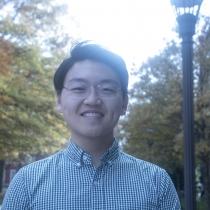
William Jun
What is your next adventure?
I am coming back to the Aerospace Engineering School to pursue a doctorate with Dr. Lightsey. I'll be continuing the research that I started at JPL, building navigational architecture for future space missions. Navigational architectures in space are like GPS here on earth where we locate ourselves by connecting to a satellite. I've been working with JPL to develop one for the moon and Mars.
What about your next adventure are you most looking forward to?
I'm excited about diving deeper into the research I started at JPL. Navigational architectures. It really embodies what I'll be doing in grad school. The task of navigating on the moon or Mars is very interesting. Our goal is to determine positioning using just one satellite, which is amazing, really, because on earth you need to use four to get that fix.
Did you have any previous co-op, internship, or research experience in this area?
I started doing research the second semester of my freshman year, when I started working on the RECONSO satellite with Professor Holzinger. I loved all of the hands-on work. Sophomore year, I joined the research team working with Dr. Spencer on Prox-1, another cubesat. I worked my way up over the last few years and, by the time it [Prox-1] was sent off-site, I was the project manager. My main task with Prox 1 was acceptance testing - where I had to ensure that the entire domain - all of the components, all the subsystems - worked together the way you expected them to. And I had to find out what didn't. The great thing about both of these experiences is that I was able to learn a lot about every single component, every single subsystem. All of my research has given me good experience in hands-on hardware and with framing up a complex problem in order to solve it.
I also interned at Northrop Grumman, half as a systems engineer, and half as model and simulation analyst. I developed software that could interface with the different simulated tool interfaces. At JPL, where I was the summer of 2018, I started working on navigational architectures, which is what I'm doing now.
How did your educational experience at Georgia Tech help you to achieve your goals?
Georgia Tech has given me every single option I could ask for and so much more. When I first toured the campus, they let me see the flight hardware lab in the ESM building. All I could think then was this is the coolest thing in the world. I cannot even imagine being able to touch these tools, and work on those problems. Little did I know that the second semester freshman year, that's exactly what I'd get the chance to do.
When I first got to Tech, I had zero skills- just my love of space. I kept finding that people willing to help dig in. There is also so many amazing mentors -- faculty and other students. I love how horizontal the opportunities are in the AE School: I can just go up to someone who's doing some amazing work, and, just by asking them, I can end up being invited to join them. The entry barrier is that low. The only thing I had to do was commit myself to the work, to put in at least 100 percent.
What advice would you give to an underclassman who would like to follow the same path?
It would be three things.
First, get involved. Whatever you like, find it -- it's here -- and get involved one way or another.
Second of all, find a group of students who you feel comfortable with and find a couple of professors you like that you can approach for advice. Georgia Tech has so many people with so much knowledge to share. It's worth it.
Third, I'd say, essentially, don't be afraid to jump in. One of the biggest things I learned from all of my research was to jump in and keep going. Sure, when they hand you a research assignment and you won't know the words, the technical terms, the equations - it's hard. You have to get beyond that, to the point where you are saying to yourself: "how can I use the skills and knowledge I have to figure this out?" Don't let that initial learning curve be the reason you don't try. Because once you get over that curve, that's when it gets good. And that's when people will start coming to you for answers.